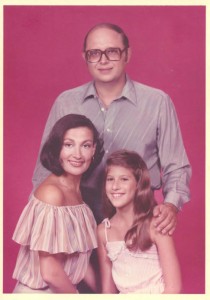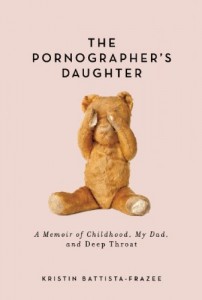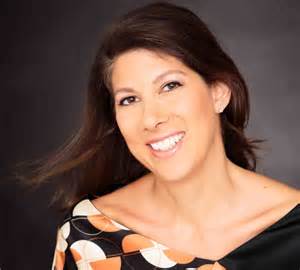Memoir Chronicles How Father’s Decision to Enter Porn Industry Threatened Family

A childhood photo of Kristin Battista-Frazee with her parents Anthony and Frances Battista. Photo courtesy of elconfidencial.com.
Social worker Kristin Battista-Frazee‘s father Anthony was a stockbroker in 1974 when he struck a deal with friends and associates to distribute the controversial but wildly popular pornographic film “Deep Throat.”
Anthony thought distributing the film would enable him to earn extra money to provide an American Dream lifestyle for his wife Frances and Kristin, who was only four years old at the time.
However, his decision to get involved with the movie had grave impacts on his family. Anthony Battista lost his stockbroker job at a well-known firm and had to enter the adult entertainment industry full time to support his family.
The federal government indicted him for distributing the film and he spent years in court trying to clear his name.
And worry and her husband’s career decisions put enormous stress on Frances, who suffered from depression and eventually attempted suicide.
Kristin Battista-Frazee, MSW, a Washington, D.C. marketing and communications professional who is a freelance writer for the Daily Beast, decided to write the 2014 memoir”Pornographer’s Daughter” ($24.95, Skyhorse Publishing) to chronicle how her father’s decision affected her formative years and helped shape her into the woman she is today.
Q: You kept your father’s career secret from friends when growing up. Many families refuse to deal with secrets that may be harmful. So why did decide to write about your family’s experiences in “The Pornographer’s Daughter?”
Battista-Frazee: When things are brought out in the open it takes away the power it once held over you. It was just seemed the right time to give voice to a great, unique story and explore and document my family history and how we were connected to “Deep Throat.” I also made a decision that just didn’t want to wait until my parents were gone to tell our story. I knew once they passed it would be too hard to collect all the details.
Q: Why did you decide to do social work?
Battista-Frazee: Like most everyone who enters the social work profession, I had a desire to help others and I wanted to be a part of fighting against the injustices people faced in the world. The philosophy of social work, in which a person is impacted by many factors in their environment, just always made perfect sense to me and this perspective has been the anchor that has kept me in the profession.

Book cover
Q: Did your family’s experience also prompt you to enter social work?
Battista-Frazee: When I entered my master’s program at Columbia University, I wasn’t totally cognizant of the influence my family’s history had in pursuing a social work degree but now I see it did have an impact. I think many of the things I learned during graduate school laid the groundwork for becoming much more reflective about my mother’s struggle with depression and her suicide attempt and the times when I was depressed. This certainly guided my work at Mental Health America and the National Council for Behavioral Health, and gave me a better understanding about the importance of educating about mental health disorders and access to treatment.
I found my passion to advocate for what I believe in from my father who faced many court battles regarding First Amendment Rights. Dad and his partners were underdogs in their struggle to stay in the adult business, and while his challenges began for financial survival, it became more about the principles of free speech, too. Although free speech rights around pornography are important, I would not equate this with some bigger problems like poverty, racial injustice, women’s rights or a host of other vexing issues.
Q: How has your father’s career and your parent’s relationship with each other influenced your attitudes toward sex, pornography and feminism?
Battista-Frazee: I think my father’s career influenced my views on the issues you mention in some unexpected ways. Sex I’ve learned is not just a part of our personal relationships it is infused in our politics, culture, fashion, art, religion and many other aspects of our lives. It’s extremely polarizing to discuss too. I find it interesting “Deep Throat” was able to open people’s mind to imagine female and male sexuality as being equivalent, and I think this equality influenced women to fight for equality in other areas like the equal rights, access to birth control, the legalization of abortion, and a host of other issues.
I think pornography is wrong for some people and fine for others. It’s a personal choice. We still have a hard time today reconciling how pornography fits in to our culture. There are things we all agree on, such as pornography should only be viewed by adults, but despite our sexualized culture people are still very uncomfortable talking about sex. People also don’t understand the existence of pornography is a product of living in a free society and when you try to scrub pornography from our lives it has free speech implications. I believe pornography has a productive place in our society and I hope we can continue to better balance how it exists in our world.

Kristin Battista-Frazee today.
I have mixed feeling about feminism. On the one hand I’m grateful the women’s movement in the 1970s took up many worthy women’s rights issues, which I benefit from today. But this movement’s stance on pornography and the way women are sometimes portrayed as victims has puzzled me. I would venture to say that the word “feminism” is outdated and doesn’t exist as an organized movement anymore because there are no clear goals articulated. In the 1970s, the feminist movement professed a woman has ultimate control over their own bodies but if a woman chose to act in adult films, strip or even enter prostitution, it was wrong and these women in the adult industry were labeled as victims which I don’t necessarily agree with. Furthermore, sexual harassment and discrimination against women I believe is just as likely to happen in a big corporate boardroom, law and medical profession or on Capitol Hill, as it does on an adult film set.
Regarding how my parent’s relationship influenced me, I’ll simply state, I learned as much from their successes as I did from their mistakes. Overall their influence left me with a solid foundation to have a successful life.
Q: What has been the reaction to the book from your family and the public?
Battista-Frazee: The reaction has mostly positive. Lots of people just didn’t realize I had this family history and have been supportive, naturally curious and cheering me on as the book continues to move out in the world. I think this is a relatable story and everyone has an unconventional family history in some way and those larger than life characters in their families.
Q: Why should fellow social workers read this book?
Battista-Frazee: Social workers should read this book because it’s a relatable family story and it they will remind them about their own relatives who have influenced their work. Social workers will inherently understand, just as I detailed in my book, that we all have our important influences that have made us passionate about social work. I wrote about this notion recently on my blog in the post Telling Your Mental Health Story to launch the #MyMentalHealthStory campaign. There are also aspects of my memoir that details my time in graduate school while earning my MSW degree and my experience at my first job as a geriatric social worker in New York City. Overall I think social workers will realize they have so many of their own stories to share.
Q: What is going on in your life now?
Battista-Frazee: In addition to promoting my book, “The Pornographer’s Daughter,” I currently I work at 2U, Inc. as a marketing consultant to support the University of Southern California’s online social work master’s degree program. I was formerly the marketing director for this program and it’s been wonderful to be part of helping students find their passion through becoming social workers. It reminds me of when I started graduate school.
| Leave A Comment
Advertisement
Leave a Comment
You must be logged in to post a comment.


